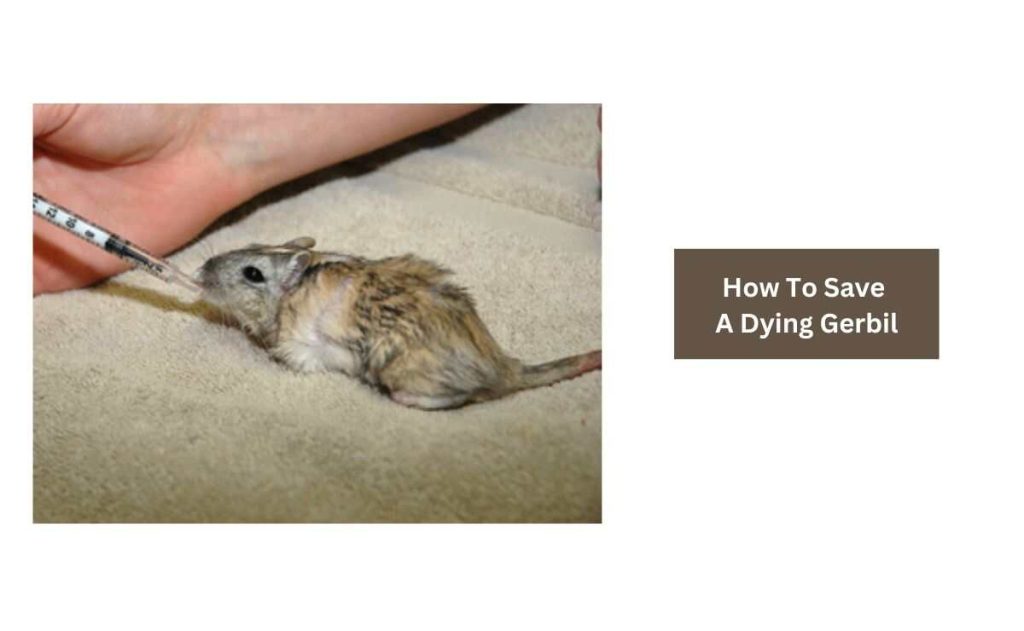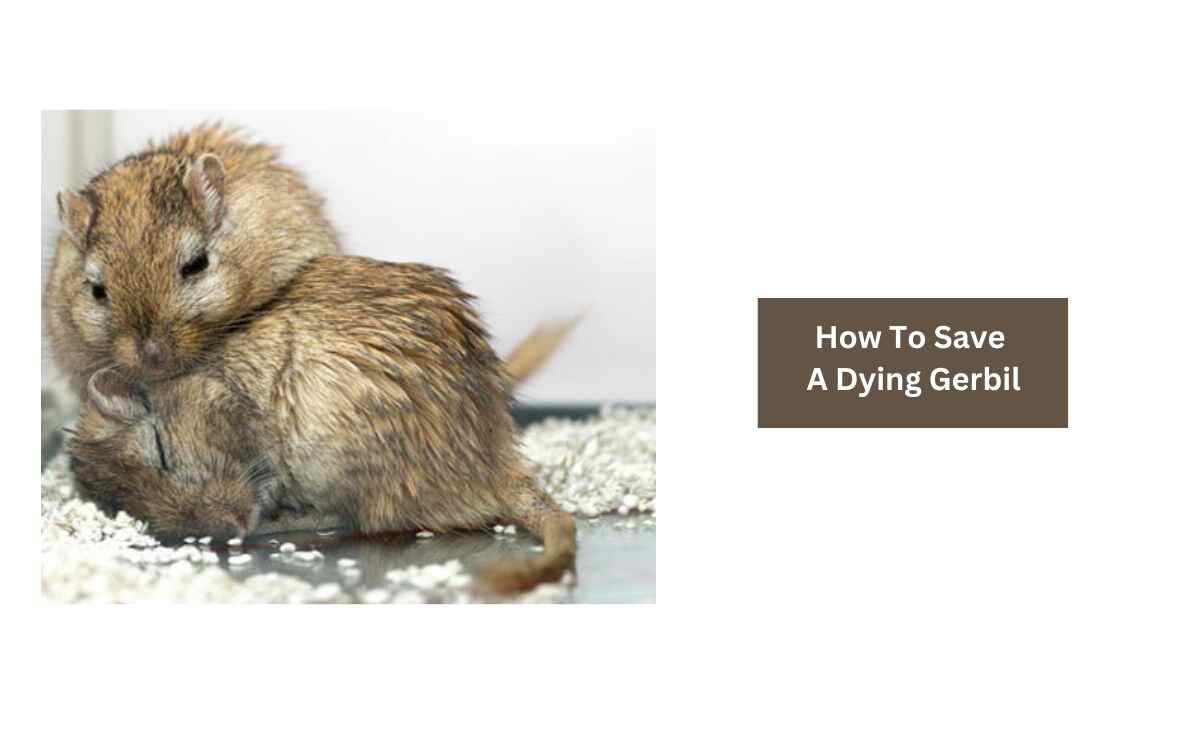When our beloved gerbil companions grow old and very ill, it’s very heartbreaking to witness this. During their final stage of living , one thing we keep searching how to save a dying gerbil.
Unfortunately, gerbils have a very short lifespan. So it’s a natural process of their decline. There is no significant way once your gerbil’s body starts to shut down. Still, you can consult an experienced veterinarian to examine their health, if there is something major illness, or just get pain relief medication.
How To Save A Dying Gerbil?

Typically, gerbils as a pet can live 2 to 4 years, some nearly reach 5 years. So when they lived the duration, you can’t do anything to save the dying gerbil. Whether you provide them with the best treatment, they won’t respond to it.
It’s a shocking matter when your gerbils start to deteriorate before the expected duration. They’re drying due to some disease that can actually be fixed. Also, you don’t leave your gerbils to suffer. You can save your dying gerbils by taking them to the vet. Otherwise, there is no other option left to save their life.
Your first and most crucial step is to reach out to a veterinarian. They have a deep understanding of animal health and can provide expert guidance. They can diagnose your gerbil’s condition and suggest treatments for the situation.
Then, you need to take care of your gerbils and take the necessary steps to keep them warm and comfortable. Though you can’t save them for a long time it’s worth to give a try.
What Are The Signs Of Dying Gerbils?
Gerbils die suddenly or unexpectedly but some gerbils display noticeable indications that their body is shutting down.
It’s never easy to see your gerbil in a declining state, but recognizing the signs of a dying gerbil is important for providing the care and support they need in their final moments.
One of the most common signs is a significant decrease in activity and energy levels. You notice that your gerbil is spending more time sleeping, and has a decreased interest in its usual activities or toys. Additionally, a dying gerbil shows a loss of appetite and a noticeable weight loss.
Changes in behavior can also be indicative of a gerbil’s declining health. Your gerbil becomes more withdrawn and less interactive with you or its cagemates. It also shows signs of weakness or difficulty in moving around. Additionally, you may notice changes in its grooming habits, with a gerbil that is dying showing a lack of interest in self-grooming.
Deterioration in physical appearance also is another sign of an aging or dying gerbil. The fur becomes dull and unkempt, and its eyes may appear sunken or cloudy. Another visible sign can be difficulty in breathing, characterized by rapid or shallow breathing, wheezing, or gasping.
If you observe any of these signs in your gerbil, it is imperative to consult with a veterinarian who specializes in small animals. They will be able to assess your gerbil’s condition and provide appropriate guidance on how to provide comfort and care during this time.
While it is important to be aware of these signs, it is essential to remember that the aging process is a natural part of life. Providing a comfortable and nurturing environment for your gerbil, as well as ensuring that it receives proper veterinary care throughout its life can help to prolong its lifespan and provide a good quality of life.
How To Make A Dying Gerbil Comfortable?
While it is a difficult time, there are some steps you can take to make your gerbil as comfortable as possible. Here’s a guide to help you:
Comfortable Temperature
As gerbils near the end of their lives, struggle to regulate their body temperature. Maintaining the right environment is essential.
The ideal temperature for a gerbil is between 65-75 degrees. If the room temperature is hot, they will get heatstroke and speed up the dying process. Similarly, colder conditions can cause hypothermia. So ensure the room they are in stays within this range.
- In cold weather, you may need to use a heater.
- Add an extra layer of bedding to help your gerbil trap heat and create a cozy burrow for warmth.
- Keep the enclosure away from drafts, and ensure the cage is not exposed to direct sunlight. Glass can amplify heat, so be cautious of where the cage is placed.
- Turn on the fan if it’s too hot.
Create A Stress-free Environment
Dying gerbils need peace and quiet to conserve their energy. At this time, they sleep more, and a suitable environment is required. Providing a calm environment can significantly enhance their comfort.
Isolate the dying gerbil if you have multiple gerbils in the same cage. This allows it to rest without being disturbed by cage mates’ activities.
Gerbils like dark and quiet spaces to live in. Create a dark and quiet space where the gerbil won’t be disrupted. Ensure children and other pets are supervised to prevent disturbances.
Show Affection
As Gerbils are social animal, offering affection and companionship can provide comfort to your gerbil during its final days. Petting your gerbil gently can release oxytocin, also known as the “love hormone,” which can help reduce stress and make your gerbil feel more relaxed.
Pay attention to your gerbil’s cues to understand how much interaction it desires. Some gerbils may want to curl up on your lap, while others may simply enjoy your presence near the cage.
Talk to your gerbil in soft, high-pitched tones to reassure it that it’s not alone. Spending quality time together can bring comfort to both you and your pet.
Ensure that your gerbil has space
While showing affection is important, it’s equally crucial to recognize when your gerbil needs solitude.
If your gerbil resists handling and shows signs of discomfort or pain, it’s best to leave it alone. The handling process could be stressful and painful. It’s essential to understand when your gerbil wants to rest and conserve its energy. Respect its need for solitude during these times.
Offer Treats
Offering treats to your gerbil during its final stages can be a way to provide enjoyment and sustenance. Feeding your gerbil its favorite treats can offer moments of happiness.
Treats can also help if your gerbil is refusing regular food, ensuring they receive some nourishment and maintain energy levels. Encourage your gerbil to eat, even if you need to hand-feed it temporarily. This not only provides sustenance but also offers a final bonding opportunity. But you should be cautious about any underlying health conditions.
Pain Medication
In cases where gerbils are suffering from painful or uncomfortable health conditions, pain medication may be necessary. But do not self-prescribe. Consult a veterinarian to assess your gerbil’s condition and administer appropriate pain relief or antibiotics if needed.
Signs of pain in gerbils include loss of appetite, labored breathing, aggression, and more. If your gerbil exhibits these signs, consult a vet to determine the best course of action, which may include pain management or euthanasia to prevent suffering.
Providing comfort and care to your dying gerbil is an act of compassion. By following these steps, you can make their final moments as comfortable and peaceful as possible.
Final Words
Gerbils don’t live long. So it’s impossible to save a dying gerbil once it lived its life. However, gerbils are prone to various fatal health diseases like heart failure, strokes, respiratory disorders, etc. If your gerbils are affected by these diseases, it’s hard to save them.
However, you must consult a vet for treatment and ensure their comfort.
